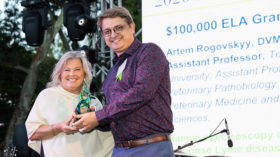FOR IMMEDIATE RELEASE
Bay Area Lyme Foundation Researcher Validates New Approach to Overcome Challenges of Lyme Disease Diagnosis in the Lab
Using samples from the Lyme Disease Biobank, Raman spectroscopy is identified as a potentially more sensitive test for diagnosing Lyme disease
Portola Valley, CA, February 9, 2023 — Bay Area Lyme Foundation, a leading sponsor of Lyme disease research in the US, today announced results of a laboratory study published in the peer-reviewed journal Frontiers in Cellular and Infection Microbiology that identifies Raman spectroscopy as a promising diagnostic approach for Lyme disease, a condition that affects nearly 500,000 new patients annually. Conducted by one of Bay Area Lyme Foundation’s Emerging Leader Award winners, Artem Rogovskyy, PhD, DVM, along with researchers from Texas A&M University, the study identified Borrelia infection with 88% accuracy, 85% sensitivity, and 90% specificity using Raman spectroscopy, a light-based test commonly used in chemistry labs, to evaluate human blood samples provided by Bay Area Lyme Foundation’s Lyme Disease Biobank.
“By identifying a unique spectrum fingerprint to detect Lyme borreliosis faster, Raman spectroscopy has the potential to diagnose the disease earlier,” said Dr. Rogovskyy, associate professor of Veterinary Pathobiology at the School of Veterinary Medicine and Biomedical Sciences at Texas A&M University. “We hope that developing an effective, robust, and rapid diagnostic test will help overcome current challenges in Lyme disease diagnosis.”
The study aims to address the immediate need for more sensitive diagnostics in Lyme disease as the current gold standard diagnostic has been shown to be insensitive in up to 60% of early-stage patients and up to 30% of late-stage patients.
“The lack of an accurate diagnostic test is not only a challenge for clinicians trying to properly diagnose and treat patients, but also makes clinical trials for new treatments difficult,” said Linda Giampa, executive director, Bay Area Lyme Foundation. “Our hope is that new approaches like this one will allow for early detection and treatment of all patients with Lyme disease.”
